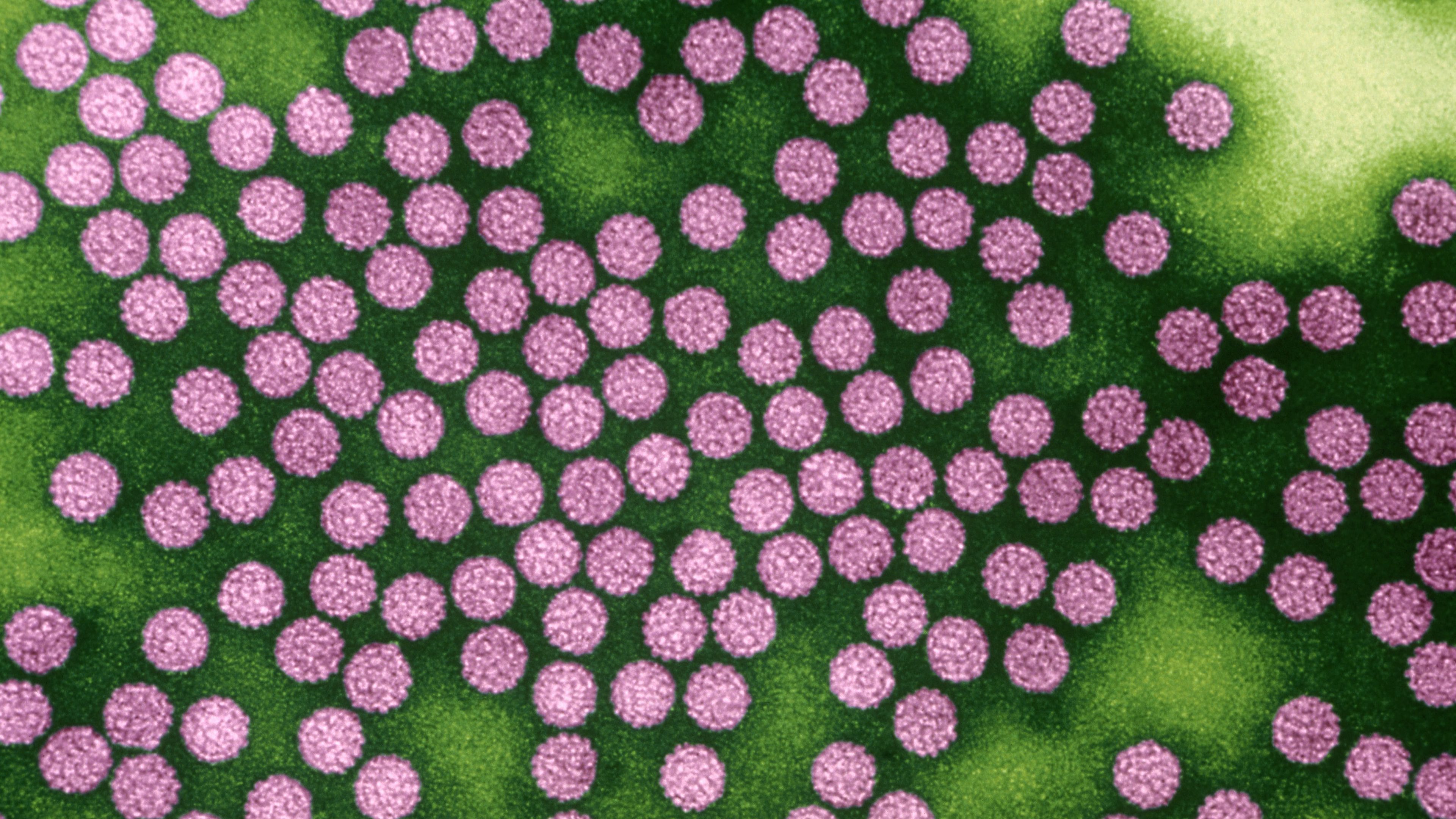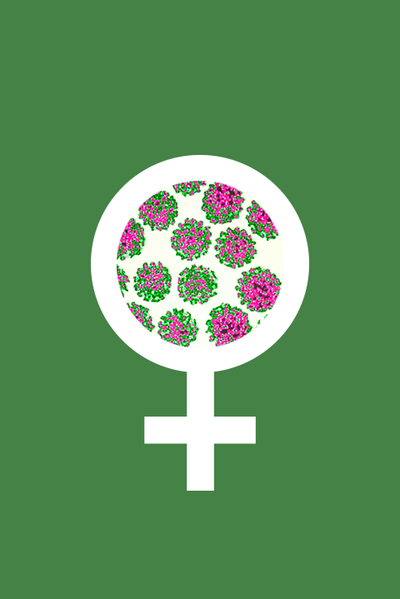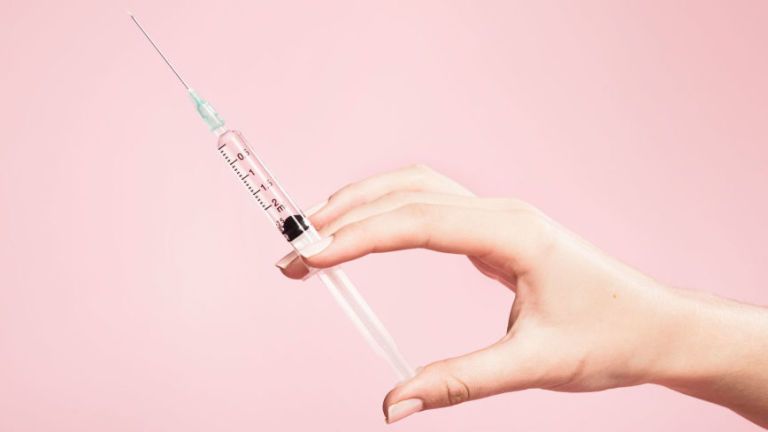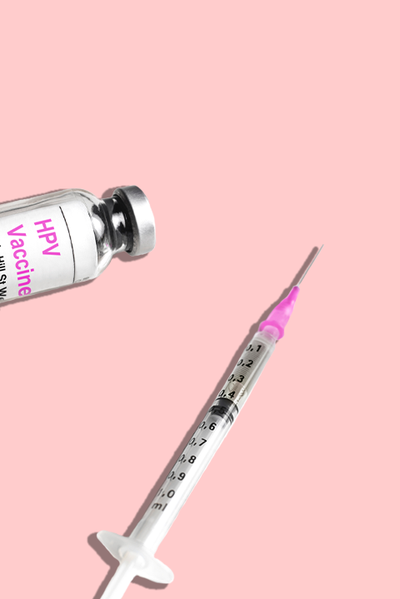Everything You Need to Know About HPV—Including What Your Doc Won't Tell You
The disease is common and potentially dangerous, but it doesn't have to be scary.


This past summer, a 27-year-old public relations executive named Gabby went in for a gynecological exam. She had started seeing a new guy recently, and although both had gotten tested for STIs after their last respective hookups, the usual "what ifs" had started to brew. Bombarded by news of record high STIs, super gonorrhea, and far-reaching herpes diagnoses, the fear that somehow she had contracted something began to consume her.
She reminded herself of her hypochondriac tendencies but booked an appointment anyway. Then, a Pap smear confirmed her worst fears: Gabby was at high risk for HPV. She’d need to return for a biopsy. If the cells proved to be abnormal, they would need to be scraped off her cervix.
"Seventy-nine million Americans are currently infected with HPV."
“I'd previously gotten the HPV vaccine and my current boyfriend had been fully tested, so it seemed odd that I could get HPV,” she tells MarieClaire.com.
Gabby's thinking is logical, but what most women don't realize is that they are at high risk to HPV exposure—whether or not they’ve been vaccinated—simply because of the sheer number of people who have it.
According to the CDC, 79 million Americans are currently infected with HPV and 14 million people become newly infected each year. Additionally, the vaccine doesn’t protect against every strain of HPV, just the ones most likely to cause cancer or genital warts. More than 80 percent of sexually active women will contract one form or another of HPV in their lifetime. “Not only was I in good company, I was in almost universal company,” Gabby says.
So why didn't HPV show up during Gabby or her partner's most recent STI screening? HPV testing doesn’t fall on the regular panel of STIs for which men or women are tested. Women are only tested after a certain age or if a Pap smear comes back abnormal. Men aren’t tested for HPV unless under extreme circumstances. Barring an anal Pap smear, a test for men does not exist.

The problem is: So. many. sexually. active. people. don't. know. any. of. this.
Get exclusive access to fashion and beauty trends, hot-off-the-press celebrity news, and more.
Before the biopsy, Gabby tried to ask her doctor questions, but says she was brushed off. The doctors and nurses at her OB-GYN’s office didn’t explain what the test was like or prepare her for how the biopsy would feel (“more painful than I expected”). No one mentioned that she might bleed for days afterwards or that she could experience persistent cramps the day after the biopsy.
“I asked her what to tell my boyfriend, and she was like, ‘Well, it doesn't affect men so it doesn't matter.’ But when I did my own digging, I found out that isn't true,” she says.
MarieClaire.com spoke to multiple women who went through similar experiences regarding HPV diagnosis, testing, and education (or lack thereof). Myisha, 35, reports that she only discovered her HPV status after experiencing extreme pelvic pain. Allison* says she has had cervical cancer from HPV twice, despite being vaccinated. Melissa* found out she had HPV when she was in college, after she and her boyfriend had both been tested. “The scariest part was not knowing and feeling like I wasn't in control. Anything that falls under the category of STI sounds really scary. I wish I had been more informed beforehand. My doctor was very supportive, but I didn't know the right questions to ask in the moment,” she says.
Here's what you need to know: HPV (Human Papillomavirus is one of the most common STIs and is easily spread through sexual skin-to-skin contact. It can be passed through vaginal sex, anal, or oral sex, and can even be transmitted while kissing, especially French kissing.
Overall, more than 150 known strains of HPV exist. Most strains clear up on their own, but types 16 and 18 cause cell changes that are precursors to cancer. Though HPV is most commonly associated with cervical cancer, the virus can also cause cancer of the vagina, mouth, and throat in women.
RELATED STORIES


There's a common misconception that only women are tested because men are merely carriers of the virus. But that's fake news (yes, actually). While females are at higher risk of developing cancer, about 40 percent of the nearly 40,000 cases of HPV-related cancer each year occur in men. Among these, about 80 percent of cases affect the mouth and throat, while others occur in the anus and penis.
What makes HPV different from other STIs is the frequency with which it clears up on its own. Most people with HPV don't show any symptoms or health problems, and 90 percent of cases will go away by themselves within two years of infection, says Barbara Pahud, M.D., the associate director of the Vaccine and Treatment Evaluation Unit at Children’s Mercy Kansas City. That's great news for most men and women. But, for the remaining 10 percent, HPV can cause genital warts, dysplasia (abnormal cells that can lead to cancer), and cancer. While there's no treatment for the virus itself, there are treatments for some of the health problems it can lead to, including genital warts and cervical pre-cancer.

When you’re with a new sex partner, a critical question is whether or not they’ve been recently tested for STIs. But when it comes to HPV, the answer doesn't matter. “There is no test to find out a person’s ‘HPV status,’” says Donnica Smalls, a member of the CDC’s News Media team. This means that you and your partner could be tested for STIs, think you’re in the clear, yet have and pass on HPV. Many people are walking around with HPV and aren’t aware of it.
Since the immune system eradicates the virus in most instances, what testing is done isn’t conducted with the same frequency as other STIs (how often you should be tested should be determined by your doctor). Rebecca Brightman, M.D., an OBGYN at Eastside Women’s Associates, notes that “various guidelines exist for HPV testing, but the standard of care that currently exists recommends routine HPV testing in women over the age of 30.”
The only instance where a woman would be tested for HPV before the age of 30 is if her Pap test came back abnormal. Guidelines state that women ages 21 to 29 should be administered a Pap test every three years, and women can get tested for cervical cancer as early as 21. But again, whether you're male or female, you won’t be tested for HPV with a regular STI panel.
We have to acknowledge these inequities in testing. When I asked professionals why only women were tested, I was unanimously told that lack of male testing is due to the infrequency with which men develop warts or cancer.
But if a male is carrying a harmful strain of HPV wouldn’t he want to be aware of it? I don’t know many men out there who would be comfortable unknowingly infecting a partner with something that could be potentially deadly.
"It puts the shame and blame-burden of the most common STI on the planet onto women and girls."
No one seemed to have a straight answer for why no test is being developed for men. John Rimmer, M.D., Chief Medical Officer at Biem, a digital sexual health service, tells us that anal Pap smears for HPV testing are only administered to gay or bi-sexual men who are at high risk for developing anal cancer. And even then, it isn’t a common practice.
This imbalance in testing doesn't just put women at risk for contracting the disease, it contributes to female sexual shaming, says Mal Harrison, a sexologist and director of the Center for Erotic Intelligence. “It puts the shame and blame-burden of the most common STI on the planet onto women and girls,” she says. “It's left up to us to share our diagnosis, if our results come back positive. And many men don't understand what HPV is or how it works.”
The only thing you can do to protect yourself from the dangerous strains of HPV is vaccination. But for many people it may be too late. Vaccines are approved for men and women under 26, but recommended for pre-teens, ideally at age 11 or 12. Once you're in your late 20s, the vaccine provides little, if any, benefit.
RELATED STORIES


So why aren't women like Gabby being told all this at their doctors' offices? Is the medical community keeping HPV talk under wraps to avoid public hysteria? STIs are still highly stigmatized, and though many adults will contract HPV in their lives, confessing you have it is still taboo. In an admittedly unscientific Twitter poll I conducted of 140 of my followers, 41 percent said they would be afraid to disclose their HPV status to a partner.
Indeed, medical professionals do acknowledge that frequent testing would insight panic in the masses. “Some theorize that more widespread screening can cause unnecessary anxiety over positive tests,” says Dr. Rimmer.
The unfortunate truth and frustrating reality is that the dangerous outcomes of some forms of HPV have only been validated in the last five to 10 years. This information is all still very new. As much as we’d like to climb atop a chair and scream, ‘CAN’T YOU DO SOMETHING?!” in the face of doctors and researchers alike, it will take time for science to catch up. Until then, it's crucial that women talk to each other and their partners about HPV. At the very least making HPV a topic of conversation will help remove that stigma and minimize harm.
*Names have been changed.

Gigi Engle is a writer, certified sexologist, sex coach, and sex educator. Her work regularly appears in many publications including Brides, Marie Claire, Elle Magazine, Teen Vogue, Glamour and Women's Health.
